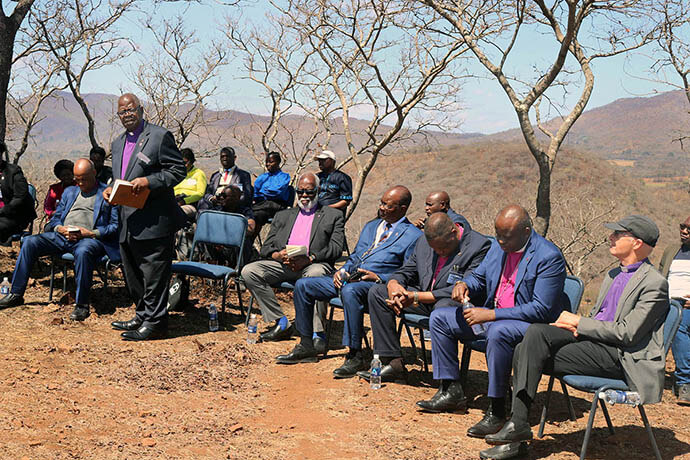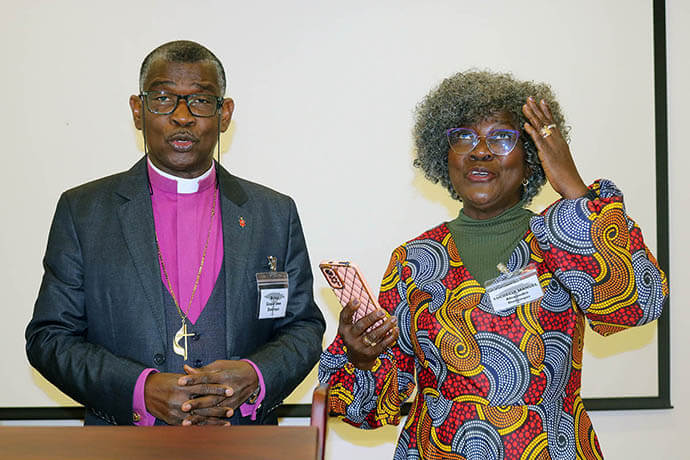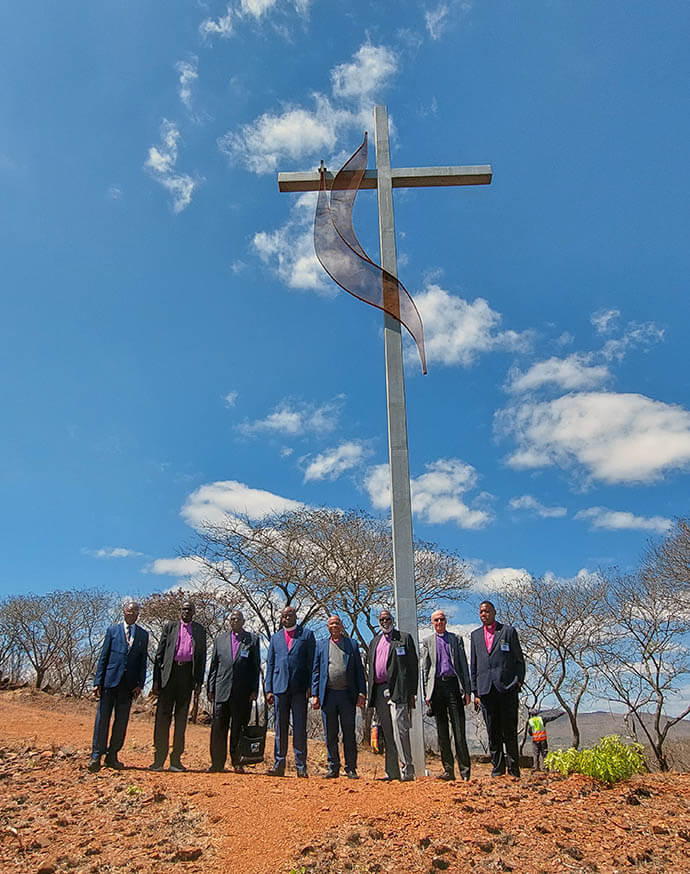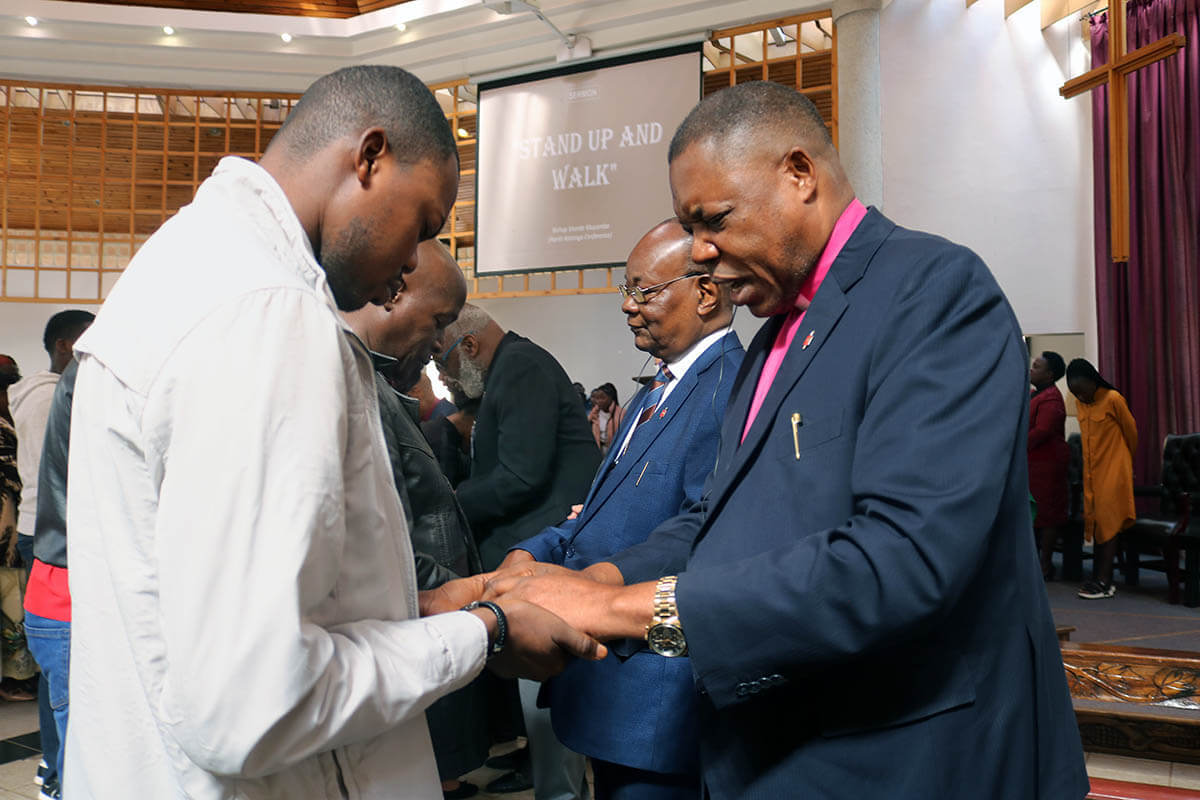Key points:
- During the Africa Colleges of Bishops meeting, 11 episcopal leaders from the African continent pledged their support for worldwide regionalization and expressed a commitment to stay in the United Methodist connection.
- Bishops urged their conferences to ratify the General Conference decision that allows them to continue mission and ministry relevant to their culture and contexts.
- Council of Bishops President Tracy S. Malone said the church is alive in Africa and is still in the business of making disciples for the transformation of the world.
- Bishop Mande Muyombo of North Katanga was selected to lead the Africa Colleges of Bishops following the retirement of Zimbabwe’s Eben K. Nhiwatiwa.
African bishops have affirmed their support for worldwide regionalization and pledged to continue the mission and ministry of The United Methodist Church.
The bishops, meeting during the Africa Colleges of Bishops annual retreat Sept. 2-5 at Africa University under the theme “Behold I am doing a new thing” (Isaiah 43:19), said it was important to remain in the wider connection and focus on church growth.
“Now is a Kairos moment for us to focus on mission and evangelism in Africa in order to advance church growth,” said North Katanga Area Bishop Mande Muyombo, who was selected president of the Africa Colleges of Bishops at the close of the meeting.
“It is also time to make mission and ministry effective in regionalization while remaining authentic and living the Gospel of Jesus Christ, while at the same time remaining connected to our brothers and sisters in the wider connection,” he said. “It is also the time to strengthen relationships with friends and partners while always bringing to the table our assets and emphasizing that we are equal partners in God’s kingdom.”
Muyombo said the African bishops are committed to support training on regionalization to provide an accurate understanding of what the plan is all about.

Under regionalization, the U.S. and the central conferences in Africa, Europe and the Philippines would each become United Methodist regional conferences with the same duties and powers to pass legislation for greater missional impact in their respective regions.
The amendment to the denomination’s constitution will now go before annual conference voters for potential ratification.
In a statement signed by 11 episcopal leaders from the African continent, including retired bishop David Yemba of the Congo Central Conference, the bishops said they supported regionalization and reiterated that they would remain in The United Methodist Church.
“We support the decision of (the) 2020/2024 General Conference to approve the Worldwide Regionalization of the Church, which allows Africa and other areas of the Church to make decisions that will best support outreach and ministry efforts in our own specific settings,” the statement said.
The bishops urged their annual conferences to ratify the regionalization amendment and explained that it would allow the church in Africa to draft and publish its own resources, such as a regional Book of Discipline, set requirements for ordination and develop practices related to marriage ceremonies that align with cultural contexts and laws in their different countries.
Yemba described regionalization as “a second transition we have been waiting for in Africa,” noting that it aims to address the question of structures and unequal standing in decision-making in the connectional system by giving regional conferences equal powers.
“Regionalization represents both an opportunity and a challenge. It will lead us into significant transition in the way we do mission and ministry. Most problems we face in church life today are caused by the way we exercise ministerial duties and powers in the community of believers and society in general,” he said.
Yemba suggested that regionalization would enhance The United Methodist Church’s execution of the great commission outlined in Matthew 28:19-20 in order to make disciples (and servants) of Jesus Christ for the transformation of the world.

In their statement, the bishops condemned those providing misinformation about The United Methodist Church and people working for the interests of the breakaway Global Methodist Church from within the denomination.
“We condemn those who are working for the Global Methodist Church while claiming to be members of The UMC and we urge them to withdraw from The UMC. We call upon them to go in peace and do it respectfully,” the bishops said.
During the bishops’ meeting, the Rev. David Bishau, Africa University director of the Institute of Theology and Religious Studies, stirred a lively debate with his presentation on “Leading in Times of Change.” The bishops discussed challenges caused by misinformation, the emergence of new churches and the exit of members in their areas.
Bishau explained that change caused confusion and polarity, creating room for misinformation. “It gives an opportunity to what I call ‘leadership predators,’ who will exploit the polarity to enhance their profiles at the expense of the envisaged high performance of the organization.”
Council of Bishops President Tracy S. Malone said attending the meeting and hearing about the bishops’ hopes and visions and the challenges they face was significant. It was clear that “the witness is strong” in Africa, she said.
“It’s one thing when you are hearing different bishops telling their stories, but to be in a space where all of them are together and hearing their collective stories and gleaning from each other the collective wisdom and best practices on how to move the church forward is very meaningful.”
Malone also noted that there is a lot of anxiety and misinformation about what General Conference decisions mean, but that the bishops are committed to educating members about how the regionalization plan would further empower them to do more contextual ministry.
“There’s greater clarity when bishops are doing the necessary teaching to make sure that people understand that there is still a sense of autonomy in Africa and other central conferences, where they can make decisions around some of those matters that were concerning, particularly around marriage and ordination.”

Asked by UM News for her message to the church in Africa, Malone said: “The United Methodist Church mission is alive, and we are still in the business of making disciples of Jesus Christ for the transformation of the world. We are a diverse church; we are a worldwide church; and there is such a level of respect and regard for traditions, customs and ministries all across the world. My encouragement is to keep pressing forward, keep pressing on in the name of Jesus.”
Mozambique and South Africa Area Bishop Joaquina F. Nhanala, the first and only United Methodist female bishop on the African continent, will be retiring at the Africa Central Conference session in March. She encouraged female clergy to heed the call to episcopal leadership.
“I want to remind the church that leadership should be for all of us. Members should really look at the calling of the person, what a person can bring to the church, competency and capability to lead the church.
“I want to encourage the female clergy that they shouldn’t feel they will not be able to lead because they are women. As they feel God’s calling, they should go for episcopal leadership,” she said.
Five African bishops will retire between now and March: Bishops Nhanala, Gabriel Yemba Unda (East Congo), Owan T. Kasap (South Congo), Eben K. Nhiwatiwa (Zimbabwe) and José Quipungo (East Angola). Bishop Warner H. Brown Jr., who has been serving as Sierra Leone’s interim bishop, will step down along with the recently appointed interim leadership of the Nigeria Area. General Conference approved the creation of two new episcopal areas in Burundi and Congo bringing the total number of new bishops to be elected to nine.
Subscribe to our
e-newsletter
African bishops select a president for the three colleges (Africa Central, West Africa Central and Congo Central conferences) on a rotational basis. The past president was the late Bishop John K. Yambasu of Sierra Leone, who died in a car crash in August 2020; Nhiwatiwa was selected to act as interim president.
The Zimbabwe Area bishop said he was thankful that the meeting went well and echoed the benefits of regionalization.
“Regionalization is very favorable to Africa because it enables you to be grounded in what you are doing,” Nhiwatiwa said. “Find out what works well for you; don’t push yourself to do things you are not comfortable with. Regionalization allows you to do what is amenable to your way of doing things.
“I am trying to demystify the idea of regionalization. It’s about putting things in your own context so that you feel comfortable,” he said.
The episcopal leaders also set aside time for prayer and reflection during their gathering. At the Sept. 4 worship service, the bishops laid hands upon and prayed for students and members of the Africa University community. They then went up to a cross on the mountain at the campus.
The cross and flame is located 3,920 feet above sea level and overlooks the United Methodist university in tandem with the cross above the university’s Kwang Lim Chapel and the cross at the Ehnes Memorial Church at neighboring Old Mutare Mission.
At the mountain, the bishops — led by Bishops Yemba and Brown — took time to pray, share and reflect that the church is experiencing challenging times but the cross remains a symbol of hope and a bright future.
“We are in a time of transition,” Brown said. “The future is going to look different from the past. We need to trust God and follow his lead.”
The next retreat will be Sept. 1-6, 2025, in Luanda, Angola.
Chikwanah is a UM News correspondent based in Zimbabwe.
News media contact: Julie Dwyer or Tim Tanton at (615) 742-5470 or newsdesk@umnews.org. To read more United Methodist news, subscribe to the free Daily or Weekly Digests.



